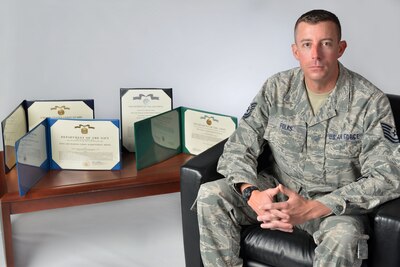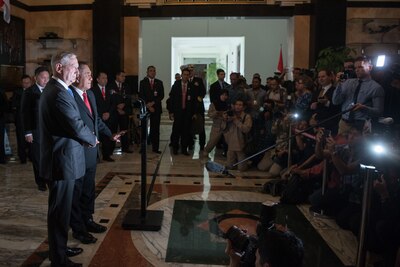By Air Force Airman 1st Class Alexandra Singer, 633rd Air
Base Wing
JOINT BASE LANGLEY-EUSTIS, Va., Jan. 24, 2018 — Not many
people can say they’ve received awards from four out of the five branches of
the armed forces, but through hard work, dedication and a love for his job, Air
Force Tech. Sgt. Ryan Folks has achieved just that.
He said his humble beginnings are what made him who he is
today.
“Although we may have not had the best of everything, we
made the best of everything,” said Folks, who is a health systems specialist
with the Virginia Air National Guard’s 192nd Medical Group here, the
noncommissioned officer in charge of the 149th Fighter Squadron medical
element, and an aerospace medical services technician.
From the time he was born, Folks said his grandfathers both
taught him to not take things for granted.
“I learned to always treat people the way you want to be
treated and to try to make a difference,” he said.
Beginning of a Career
Folks said he initially wanted to build racecars for a
living, but his plans changed.
“Divine intervention stepped in, and next thing you know I
wanted to do something in public safety -- whether it be fire, police or
emergency medical services -- but I didn’t have the money to do it,” Folks
said. “I found a job where I could be paid to do it all and that’s when I
enlisted in the U.S. Coast Guard.”
He spent the first four years of his career aboard the U.S.
Coast Guard Cutter Chase in San Diego.
“I started working as a mechanic’s assistant, but we were
called firemen or firemen apprentice. It dates back to the days of steam
engines; it was our job to keep the fire going,” Folks said. “I knew I wanted
to do something medical, but there was a two-year wait, then they closed the
school.”
While on the Chase, Folks was recognized for his hard work
and received the Coast Guard Achievement Medal.
“The first achievement medal was very humbling,” he said. “I
felt as if I was just doing my job, but they saw that I could wear many
different hats. I’m happy to help out anybody who needs it when they need it.”
Folks continued in the Coast Guard Reserve and was
transferred to San Francisco. He was cross-trained from administration and
personnel work to medical work and was sent to corpsman school and oversaw
medical readiness for troops.
Then, he said, “I met somebody pretty amazing and decided to
follow her to the East Coast.”
After a year and a half stationed in San Francisco, Folks
moved to Massachusetts with his new wife and was assigned to a port security
unit.
Joint Service
“I was sent to independent duty corpsman school, which is
basically being a medical provider,” he said. “On top of doing medical stuff,
they sent me to a lot of training in Camp Lejeune, North Carolina. My last
stint with them was an eight-month deployment to the Middle East.”
During that time, he worked with different branches of
service, as his job was to provide waterside security to high-value assets and
cargo ships going in and out of the port, as well as seeing patients out of the
clinic.
“The cool thing about medicine is that it’s universal,”
Folks said. “People are going to get sick, they’re going to slip, trip and
fall, and it doesn’t matter what uniform you’re wearing. It’s one team, one
fight. This led to the second achievement medal.”
During his deployment, the Navy recognized him for a job
well done.
“I was the only Coast Guard corpsman that went with my unit
and they primarily had me work out the clinic,” Folks said. “They also needed a
medic to provide medical coverage for the waterside security team, so with my
law enforcement background, they said, ‘Folks, you’re our guy.’”
Change of Pace
After almost 10 years in the Coast Guard, Folks made a
life-changing decision to separate from the armed forces.
“[My wife was also an] active-duty military member and it
was becoming hard for us both to be co-located without one of us being gone all
the time,” Folks said. “She was tasked to go to school in San Diego and I knew
if I was to follow her, I’d be deployed right away. I decided it was my time to
go back to school.”
He stayed on Inactive Ready Reserve status for about a year
and a half. During that time, Folks took care of his daughter while also going
to school full-time for nursing.
Finding a Purpose
Folks was in his Saturday morning Biology class when his
wife called to tell him that his daughter had been knocked unconscious in a
playground accident.
As they were rushed into an ambulance, they realized the
stroller they had with them would not fit in the back of the emergency vehicle.
“[The firefighters] ended up throwing it in the back of a
fire truck and said, ‘Hey, just come pick it up when you get discharged,’”
Folks said. “The paramedics that took care of her were awesome.”
After his daughter was discharged, Folks went to thank the
emergency responders personally, and they gave him a tour of the station.
“This experience kind of rejuvenated my love of wanting to
help people again,” he said. “I wanted to be like the guys that were there for
my family; I want to be able to do that for somebody one day.”
After his wife completed her military schooling, she
received orders back to the East Coast again, but this time to Virginia.
Unfortunately, all the hard work Folks had put into his school work would not
be able to transfer with him. But after his experience with the emergency
medical team, Folks found an emergency medical services program to attend.
Back to Work
“I realized I also missed wearing a uniform,” he said. “I’m
going to get back in, but I’m going to do this right.”
Folks enlisted into the Virginia Air National Guard and
immediately discovered that none of his credentials from the Coast Guard or
civilian schooling would transfer. Although he was an independent duty corpsman
with a nursing background and one semester away from a paramedic’s degree,
Folks was required to go back to tech school and start from the ground up.
After working his way back up in the Air National Guard,
Folks was assigned as the noncommissioned officer in charge of the squadron
medical element, which led to a full-time position with the 192nd Medical
Group.
“The opportunity arose to deploy, [and] around this time my
wife decided that being married to me and juggling two careers wasn’t working
out,” Folks said. “It is what it is. It’s been my driving force now.”
He said the deployment was exactly what he needed. He was
able to mentor junior troops and was able to have more hands-on care with
patients, which is what he was most passionate about. He was also able to apply
the knowledge he acquired from his Monday through Friday job as a health
systems specialist.
"Having just served with Tech. Sgt. Folks while
deployed, I got to witness his professionalism and work ethic, firsthand,” said
Air Force Lt. Col. Michael Schaner, commander of the 149th Fighter Squadron.
“He is absolutely the best of the best, as you can't beat his vast experience
in multiple services, positive attitude in everything he does and willingness
to put the team before himself."
After returning from deployment, Folks received the Air
Force achievement award, noncommissioned officer in charge of the year award,
and overall guardsman of the year awards.
He also earned an Army achievement medal.
Now with a new home and all his awards under his belt, Folks
is hopeful about what the future holds.
“Your time in the military is really what you make of it,”
he said.










